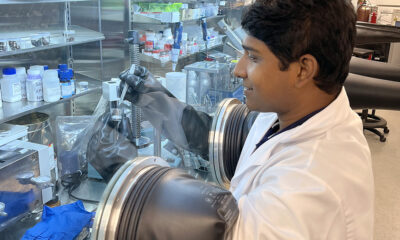Health
Western Diets Transform Gut Microbiomes of Indo-Canadians

Research conducted by scientists at UBC Okanagan reveals significant alterations in the gut microbiome of Indo-Canadians as their diets shift toward more westernized eating habits. This study indicates that such dietary changes may be linked to an increased risk of inflammatory bowel disease (IBD) among South Asian immigrants in Canada.
The international study, published in the journal npj Biofilms and Microbiomes, involved over 170 participants from both India and Canada, including Indo-Canadians, first-generation Indian immigrants, Euro-Canadians, and Euro-immigrant controls. Lead author Leah D’Aloisio, a Master of Science graduate at UBC Okanagan, emphasized the importance of understanding how dietary transitions impact gut health, particularly in non-European populations that are often underrepresented in microbiome research.
Significant Findings on Microbiome Changes
The research found that both Indo-Canadians and first-generation Indian immigrants experienced notable changes in their gut microbiomes compared to Indians residing in India. The most pronounced shifts were observed in Indo-Canadians, who exhibited a microbiome characterized by the loss of beneficial Prevotella species, which are associated with high-fiber, plant-based diets. In contrast, their gut profiles showed an increased prevalence of microbes common in western populations, such as Blautia and Anaerostipes.
Dietary analyses revealed that ultra-processed foods accounted for more than 60% of Indo-Canadians’ daily caloric intake, compared to just 12% in individuals living in India. Furthermore, the fibre intake was notably highest among Indians in India and lowest among Indo-Canadians.
Dr. Deanna Gibson, a Professor of Biology at UBC Okanagan and a senior author of the study, commented on the implications of these findings, stating, “Our study shows that the gut doesn’t just adapt to where you live, it adapts to what you eat.” This indicates that Indo-Canadians possess a microbiome that reflects a blend of traditional and western dietary influences, potentially heightening their risk of chronic diseases.
Health Implications of Dietary Acculturation
The study highlights a concerning trend: South Asians in Canada experience an incidence of IBD that is more than six times higher than that of their counterparts in India. Researchers attribute this alarming increase to dietary acculturation, which involves a shift from traditional, fibre-rich diets towards ultra-processed foods that are high in sugar and additives.
Dr. Gibson cautioned that the rapid industrialization of food systems in India could lead to similar health risks, as the adoption of western dietary habits becomes more prevalent. “Indians living in India should take note: stick with the traditional dietary patterns,” she advised. The researchers noted an uptick in IBD cases in India in recent years, correlating with the increased westernization of diets.
The findings of this research extend beyond the Indo-Canadian community. They underscore the broader implications of immigration and globalization on health and disease prevention. As dietary patterns continue to evolve globally, the gut microbiome emerges as a crucial marker of health risks associated with migration and cultural change.
Collaborators on this project hail from various countries, including Canada, India, the UK, and the US. As the global population becomes more mobile, the researchers advocate for the development of culturally relevant dietary guidelines and health strategies aimed specifically at immigrant populations.
D’Aloisio concluded by emphasizing the need for further research into the factors driving disease within immigrant communities, stating, “The exact causes of IBD are still unclear, but seeing risk emerge so quickly in immigrant populations gives us a unique opportunity to pinpoint the factors driving disease and to support communities in keeping protective food traditions alive.”
-

 Politics4 weeks ago
Politics4 weeks agoSecwepemc First Nation Seeks Aboriginal Title Over Kamloops Area
-

 World5 months ago
World5 months agoScientists Unearth Ancient Antarctic Ice to Unlock Climate Secrets
-

 Entertainment5 months ago
Entertainment5 months agoTrump and McCormick to Announce $70 Billion Energy Investments
-

 Science5 months ago
Science5 months agoFour Astronauts Return to Earth After International Space Station Mission
-

 Lifestyle5 months ago
Lifestyle5 months agoTransLink Launches Food Truck Program to Boost Revenue in Vancouver
-

 Technology3 months ago
Technology3 months agoApple Notes Enhances Functionality with Markdown Support in macOS 26
-

 Lifestyle3 months ago
Lifestyle3 months agoManitoba’s Burger Champion Shines Again Amid Dining Innovations
-

 Top Stories2 months ago
Top Stories2 months agoUrgent Update: Fatal Crash on Highway 99 Claims Life of Pitt Meadows Man
-

 Politics4 months ago
Politics4 months agoUkrainian Tennis Star Elina Svitolina Faces Death Threats Online
-

 Sports5 months ago
Sports5 months agoSearch Underway for Missing Hunter Amid Hokkaido Bear Emergency
-

 Politics5 months ago
Politics5 months agoCarney Engages First Nations Leaders at Development Law Summit
-

 Technology5 months ago
Technology5 months agoFrosthaven Launches Early Access on July 31, 2025



















